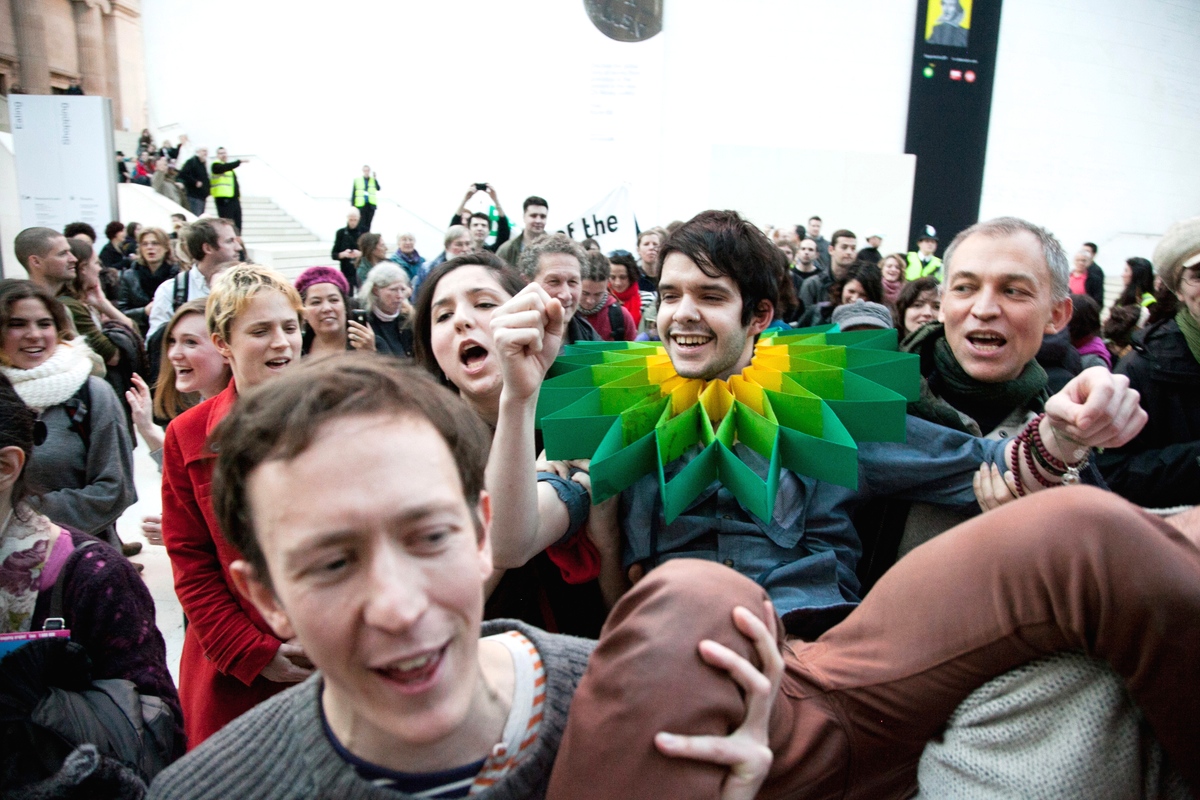
“From the ballet to the football, big oil sponsors everything," London researcher Mika Minio-Paluello tells me. "Today, more and more people realize that oil companies are fundamentally destructive and threaten global society’s survival – but to try to buy off popular opposition, these oil companies give tiny amounts of money to sponsor arts and culture.”
I spoke to Minio-Paluello, who works with the arts and activism organization Platform, just after we'd witnessed the arrest last Sunday of an anti-BP "Viking" who had tried to make his way into the British Museum.
The protester, who handed his wooden sword and shield to security and answered to the name Thor, stood by calmly as we was arrested by officers who failed to explain why exactly they were arresting him. But he didn't come alone. Moments later, a horde of two hundred more Vikings filled the grand main hall of the museum.
There, they built a longboat and gave a ceremonial burial to BP – bringing an unexpected theatrical performance and song to the oil giant's sponsorship of the centerpiece Viking exhibition. Tourists and visitors crowded around, surprised and curious. Some read the handouts that told that “BP is only sponsoring our history, to help it get away with destroying our future.”
After the action I asked Jo Ram, an environmental campaigner and researcher involved in the action, to explain why BP and Big Oil’s commercial sponsorship is being challenged.
“BP and Shell are involved in numerous malpractices including tar sands extraction in Alberta, Canada, which destroys the forests and livelihoods of the people who live there, polluting the water, spreading cancers to people and animals," she said. "These oil majors based in London are both lobbying the European Union to facilitate tar sands sale in Europe.”
Ram added: “Both these companies also aim to drill the Arctic, which is horrendous as this is not only a fragile environment but the region performs a climate regulatory role for the entire planet. By destroying this, we will have climate catastrophe.”
She mentioned other reasons to challenge the greenwashing cultural sponsorships of Big Oil – from Shell’s human rights abuses and destruction in the Niger Delta, to BP’s Gulf of Mexico oil disaster, to the giant oil contracts both companies were awarded after the invasion of Iraq.
In London, oil companies sponsor the national centers of art, opera, theater and music. The branding in turn backs up the industry’s lobbying of British politicians.
Now, in reaction, a coalition under the banner Art Not Oil has organized numerous artist insurgent spectacles, like "guerrilla Shakespeare performances" opposing the use of the Bard to sell oil, and an "oil orgy" that disrupted Canadian-British talks promoting tar sands development. The group has also installed a 35-meter wind turbine in the Tate Modern to further press its point about energy use. Recently, pressure from the actions led the Southbank Theatre to terminate its alliance with Shell.
The key message from Art Not Oil and similar groups is how pivotal London has become for the fossil fuel industry globally.
“The city embodies the unaccountability of the global economic system,” said George Barda, a supporter of Occupy London and Reclaim the Power. “Destruction that happens thousands of miles away is decided in meetings in London. The city sells itself on enabling investment in these practices, as leading player in the race to the bottom.”
Ram picked up the point. “If London did not raise the money, big oil could not do what it does, so I think this means we have a responsibility in London to challenge this industry,” she said.
A key message at the Viking protest was that sponsorship and PR come at a very low cost to BP – but at a high cost to the world. The company funds less than 1% of the British museum's income, yet its sunflower-like logo is widespread across the museum.
Jo Ram said small contributions like this – with big visibility payoffs – are repeated by fossil fuel sponsorships across Britain's cultural institutions.
“Companies such as BP and Shell also enjoy massive tax breaks, money which instead should be given to cultural institutions," she added. "But instead it benefits from dodging taxes and using a fraction of what it should pay to invest into its PR.”
Ram’s accusations about massive subsidies and tax breaks for BP and Shell are substantiated in the report Making a Killing, which reveals that offshore tax havens have enabled the companies to pay one-tenth the amount of tax they owe.
Sport, like art and culture, is another crucial way that Big Oil seeks to brand its product. In London’s 2012 Olympics, BP caused outrage calling itself a “Sustainability Partner” just two years after the Gulf of Mexico spill which was the largest ever oil disaster.
Growing anger at other corporate sponsors' ecological malpractices and crimes has led to the Greenwash Gold campaign, which honored BP with a silver medal only behind Rio Tinto, giving it the gold for its destructive mining practices and devastation of communities across the planet.
The Brazil World Cup too has seen sponsors targeted for using the football spectacle to distract from their harmful activities. During the opening ceremony, Jeguaká Mirim, a boy from the indigenous Guaraní nation from southern Brazil, unfurled a banner calling for his people’s land rights to be respected and not stolen for agri-business such as sugar plantations.
Coca-Cola has been criticized for buying sugar from companies directly responsible for the destruction of Guaraní communities. Meanwhile, it air-brushes those crimes by advertising a picture of an indigenous man laughing as he drinks a bottle.
BP isn't sponsoring this World Cup directly, though it plans to pour money into the subsequent World Cup in Qatar through its subsidiary Castrol Oil. However, BP has joined other sponsors in calling for that Cup to be moved out of the country due to claims that the bid was corrupt.
Minio-Paluello of Platform said, "My work involves tracking BP’s work in a lot of countries, like Egypt, Azerbaijan and Libya. In all those countries BP clearly engages in corruption, uses bribery or uses contractors who take bribes. So for BP to come out and say [about Qatar], ‘These people are being corrupt and we are clean,’ is hypocrisy. What they are ultimately trying to do is deflect and distract the public from their malpractices.”
Allegations of corruption have also surfaced over BP’s Gulf of Mexico compensation scheme. Further, the company has been accused of corrupting the democratic process by lobbying and influencing the British government to challenge the EU in its quest to prohibit the sale of tar sands in Europe.
Another aspect highlighted at last weekend's British Museum protest was the way BP uses violence to enforce its corporate mandate, with examples of human rights abuses and support of military attacks on people reported in Turkey, Columbia and Indonesia.
News that BP is increasing its use of drones over the United States has given cause for further alarm.
“Military action is just part of the whole package for big oil companies that enables them to get away with what they do," said Ram. "You have sponsorship on one hand and brute force on the other, pushing people, particularly indigenous, off their lands to get the resources they want.”
3 WAYS TO SHOW YOUR SUPPORT
- Log in to post comments












